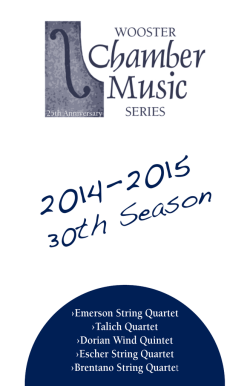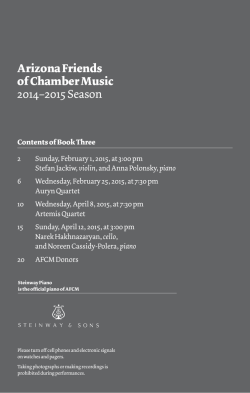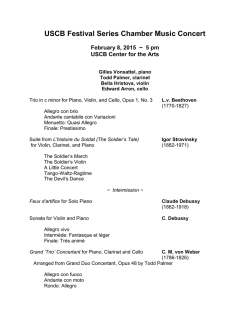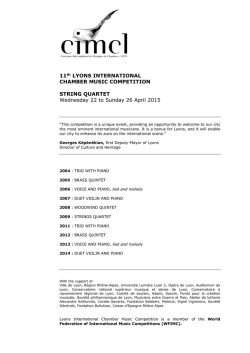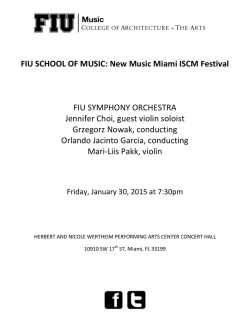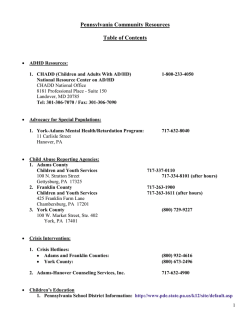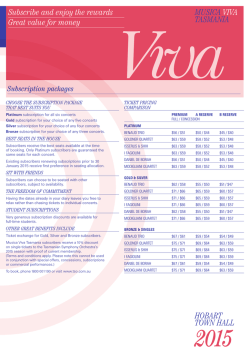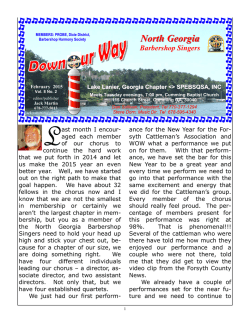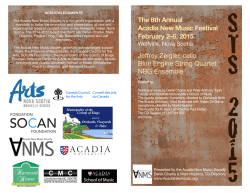
View Program - Segerstrom Center for the Arts
2014–2015 CHAMBER MUSIC SERIES TWENTY-FIFTH SEASON SAMUELI THEATER January 31, 2015 Szymanowski Quartet Saturday at 8 p.m. Agata Szymczewska, violin Grzegorz Kotow, violin Vladimir Mykytka, viola Marcin Sieniawski, cello Preview talk by Herbert Glass at 7:15 p.m. Joseph Kalichstein, piano Three Poish Chorales Mihi autem (c.1580) MARCIN LEOPOLITA (1537 – ca. 1584) Protexisti me, deus (c. 1560) MIKOLAJ OD CHRZANOW (1485 – 1562) Aleć made mna Wenus (c. 1540) MIKOLAJ OF CRACOW (c. 16th century) Arranged: Szymanowski Quartet With special underwriting from: Sam B. Ersan The Center applauds: String Quartet No. 3 (2008) “Leaves from an unwritten diary” KRZYSZTOF PENDERECKI (1933 ) Ballade No. 4 in F Minor, Op. 52 String Quartet No. 4 (1951) Andante – Allegro molto Andante Allegro giocoso FRÉDÉRIC CHOPIN (1810 – 1849) GRAŻYNA BACEWICZ (1909-1969) —INTERMISSION— Media Partner: Piano Quintet in A Major, Op. 81 Allegro, ma non tanto Dumka: Andantne con moto Scherzo (furiant): molto vivace Finale: Allegro ANTONÍN DVOŘÁK (1841 1904) Out of courtesy to the artists and your fellow patrons, please take a moment to turn off and refrain from using cellular phones, pagers, watch alarms and similar devices. The use of any audio or videorecording device or the taking of photographs (with or without flash) is strictly prohibited. Thank you. 1 About the Program Marcin Leopolita Bornin, Lwów (now Lviv, Ukraine), Leopolita is one of the most eminent Polish composers of 16th century. He studied at Kraków University (Collegium Maius) and by age 20 was already a member of royal music ensemble at the court of King Sigismund II Augustus. Only a few of Leopolita’s works that are still known today: five religious motets and a single mass:Missa paschalis. Mikołaj of Chrzanow Little is known of his early life. He was a student at the Kraków Academy in 1507, where he received his baccalaureate in 1513. In 1518 he became the organist at Wawel Cathedral, a post he held until his death. His duties there included directing the cathedral choir—the Kapela Rorantystów—and supervising construction of organs; he traveled to Biecz in 1543 to oversee the work there. His only known work is the motet, Protexisti me, Deus, which survives in tablature notation in the 16th-century Wawel Part-Books. The same composition appears in the Łowicz Organ Tablature of 1580, with the initials N.Ch., which are presumed to indicate the composer. Nicolaus Cracoviensis (or Mikołaj of Cracow) His name first appears in the Kraków University archives as organist at the Kraków court. Most of his compositions are included in two great Polish organ tablatures: one by Jan z Lublina (1537–48) and the Cracow Tablature (ca. 1548). They include his masses, motets, songs, dances and preludes. His works show Italan influence. The best known of his works is the choral work Aleć nade mną Wenus (You, Venus, above me). 2 KRZYSZTOF PENDERECKI GRAZYNA BACEWICZ Born: November 23, 1933 in Debica Born: February 5, 1909, Lodz Died: January 17, 1969, Warsaw String Quartet No. 3 Krzysztof Penderecki is considered to be Poland’s greatest living composer. His String Quartet No. 3 was commissioned by the Shanghai Quartet in 2008 for its 30th Anniversary and premiered at a special 75th birthday concert honoring the composer. It is a single movement work consisting of four to five short sections of contrasting tempos and character. Stylistically, the quartet is quite representative of his chamber works since the1990s, and stands in sharp contrast to the first two quartets from his avant-garde period. A stylistic polymath, he first came to prominence as a pioneer of new textures for string instruments, such as those found in the chilling 1960 work Threnody ‘To the Victims of Hiroshima’ for string orchestra. After completing his second string quartet in 1968, Penderecki returned to the genre only in 2008. This work reflects Penderecki’s inclusion of harmonic and textural colors associated with music of the late nineteenth century, as opposed to the highly abstract style developed by other European composers after the Second World War. “Towards the end of the work,” recalls Nicholas Tzavaras, “a spectacular gypsy melody appears, a theme that hasn’t been heard in any of the composer’s previous works. It is a melody that the composer’s father used to play on his violin, perhaps a Romanian melody, he thought, when he was a child.” Perhaps it is partly for this reason that this composer has such an affinity for the instrument and its siblings which he writes for so wonderfully. String Quartet No. 4 Grazyna Bacewicz was a prolific composer of three symphonies, seven violin concertos, concertos for viola, cello, piano and two pianos and seven string quartets of which no. 4 won composition prizes in Belgium and Poland. She was an independent spirit in mid-20thcentury Polish music. Broadly classifiable as a neo-classicist (she studied briefly with Nadia Boulanger), her unfrivolous, resolutely craftsmanlike music is much prized by those who know her output. The Quartet no. 4 dates from 1950 and is in three movements the opening movement begins with a Andante in ¾ time. It is both rich and profound and has a telling retrospective nostalgia. The allegro has a vibrancy and the reintroduction of a slower tempo does not hinder the cogent musical development in the moderato. Some of the musical phrases are of a beauty rare in music of any age. The clarity of the allegro is admirable proving this composer’s enviable ability in composing for string instruments. The music glows and is of the highest quality; it unfolds both an intellectual and emotional style which can only evince a laudatory response. The second movement, andante, has a beauty and yearning. It is music that humanity can identify with and proves that superlative music such as this is a universal language and can, in the hands of a great composer, express what words and actions never can. The finale, allegro giocoso, is a real allegro and hints at the style Bacewicz was to develop later. It has a mystery about it and a piquant sense of humour and an exuberant joy that should not be missed … and watch out for the end. Her middle-period works, such as the Fourth String Quartet and Piano Quintet recorded here, intersect marginally with late Szymanowski and Bartók in their mix of folk elements and tough-minded linearity. What appeals most (or, to some, may perhaps seem a limitation) is their restless darting from one idea to another, avoiding possible charges of opportunism but also arguably placing limits on potential breadth and depth of communication. Most striking to me are the rhythmic playfulness of the Quartet’s scherzo-like finale —a charming offshoot of the Russian tradition —and the unexpected inwardness of the slow movement of the Quintet. not long after its premiere. Fifteen years later, he reconsidered and retrieved a copy of the score from a friend and started making revisions. However, he decided that rather than submitting the revised work for publication, he would compose an entirely new work. The new quintet is a mixture of Dvořák’s personal form of expressive lyricism as well as a utilization of elements from Czech folk music. Characteristically those elements include styles and forms of song and dance, but not actual folk tunes; Dvořák created original melodies in the authentic folk style. ANTONÍN DVOŘÁK Born: September 8, 1841, Nelahozeves (near Prague) Died: May 1, 1904, Prague Piano Quintet No. 2 in A major, Op. 81 Piano Quintet No. 2 in A major, Op. 81, is a quintet for piano, 2 violins, viola, and cello. It was composed between August 18 and October 8 of 1887, and was premiered in Prague on January 6, 1888. The quintet is acknowledged as one of the masterpieces of the form, along with those of Schubert, Schumann, Brahms and Shostakovich. It was actually composed as the result of the composer’s attempt to revise an earlier work, Piano Quintet Op.5. Dvořák was dissatisfied with the Op. 5 quintet and destroyed the manuscript 3 Photo by Irène Zandel About the Artists Szymanowski Quartet Agata Szymczewska, violin Grzegorz Kotow, violin Vladimir Mykytka, viola Marcin Sieniawski, cello “It was hard not to fall in love with the Szymanowski Quartet at the Frick Collection on Sunday afternoon. All professionals perform with intensity, but playing from the heart is another matter. The sound was unusually warm, filling this small space to capacity.” – Bernard Holland, The New York Times Founded in Warsaw in 1995, the Szymanowski Quartet has developed into one of the most exceptional international string quartets of its generation. Their sophisticated programs present a perfect balance between intellect and passion, characteristics with which the Szymanowski Quartet captivates its audiences at prestigious festivals and concert halls in 4 Europe, the United States, Asia, Australia and South America. The Quartet’s extraordinarily high standard has been confirmed by numerous awards and distinctions. They took first prizes at the “Premio Vittorio Gui” Competition in Florence and the “In Memoriam Dimitri Schostakowitsch” in Hanover. They were prizewinners at the Osaka International Chamber Music Competition and at the Melbourne International Chamber Music Competition. From 2001 to 2003, the Szymanowski Quartet participated in the “New Generation Artists Scheme” of BBC Radio 3 in London. In 2005 they were honored with the “Szymanowski Award” of the Karol Szymanowski Foundation in Warsaw, the only time ever given to a string quartet. In 2007 they were awarded the Medal of Honor by the Polish government for their service to Polish culture. The ensemble is a regular guest at internationally renowned festivals such as SchleswigHolstein and Rheingau, Mozartfest Würzburg, Bregenz and Schwetzingen, Niedersächsische Musiktage as well Lockenhaus, Luxemburg, London, Cheltenham, Bath and Perth. In 2008 the Quartet founded the Lviv Chamber Music Festival, at the UNESCO World Heritage site on the border between the Ukraine and Poland. The Quartet’s concerts take them throughout the world with performances in at major concert halls such as New York’s Carnegie Hall, London’s Wigmore Hall, Amsterdam’s Concertgebouw, Vienna’s Musikverein, the Konzerthaus in Berlin, Leipzig’s Gewandhaus and Grünewald Hall in Stockholm. Regular tours to North America have brought appearances in New York, Washington DC, Los Angeles, San Diego, Vancouver and Montreal. Along with standard classical-romantic repertoire, the Quartet has a strong commitment to contemporary music. They perform the music of Magnus Lindberg, Elena Kats-Chernin, Philip Cashian, Thomas Larcher and Andrew Toowey; some of whom have dedicated their works to the Szymanowski Quartet. Recordings from several seasons of BBC concerts document the artistic versatility of the ensemble. More recently its recording of Haydn, Bacewicz and Dvořák was released on the Avie label as well as a classical/jazz crossover recording, Pure Desmond. In spring 2009 the Quartet launched the record label CAvi-music, which focuses on their namesake, composer Karol Szymanowski, in the context of three music capitals: Paris, Vienna and Moscow. Recent recordings include the Shostakovich and Weinberg quintets for Hänssler Classic and music of Zelenski and Zarebski released on Hyperion in December 2012. They were the cover feature for the February/March 2012 issue of Ensemble magazine. The Szymanowski Quartet studied at the Hochschule für Musik und Theater in Hanover with their teacher and mentor Hatto Beyerle. They continued to refine their performances working with Isaac Stern, Walter Levin and the following quartets: Amadeus, Emerson, Juilliard and Guarneri. They have been Quartet in Residence Musikhochschule Hanover since 2000. Agata Szymczewska Agata Szymczewska was born in 1985 in Kaszalin, Poland. She was the winner of the 2006 Henryk Wieniawski International Violin Competition, which launched an impressive international solo career. As winner of the first London Music Masters Award she made her debut at Wigmore Hall in 2009 and with the London Philharmonic Orchestra under Osmo Vänskä in 2010. She has performed throughout the world as a soloist, appearing under such conductors as Seiji Ozawa, Sir Neville Marriner and Krzystof Penderecki. As a chamber musician she has performed with many of the leading artists of our time including Martha Agerich, Maxim Vengerov, Gidon Kremer and Anne-Sophie Mutter with whom she toured in the United States in November 2014, including a performance at Carnegie Hall debut. She plays an Antonio Stradivarius violin (Cremona, ca. 1680) on loan from Deutsche Stiftung Musikleben. Grzegorz Kotów Gzregorz Kotów was born in 1972 in Walbrzych, Poland. After studies in his home country he transferred to the University of Music and Drama in Hanover, working with Krzysztof Wegrzyn and Hatto Beyerle on scholarships from the DAAD and the Polish Ministry of Education and Cultural Affairs. He is laureate of numerous national and international competitions. His performances both as soloist and in chamber music have taken him throughout the world. He currently teaches chamber music at the University of Music and Drama in Hanover. Kotów plays a violin made by Hans Schicker (Freiburg im Breisgau) in 1999. Vladimir Mykytka Vladimir Mykyta was born into a family of musicians in 1972 in Lviv, Ukraine and started taking violin lessons at the age of 5. He later attended the school of music for exceptionally gifted children and youth at the Conservatory in Lviv, where he studied with Artur Mykytka and Alexander Weissfeld. He studied at the Academy of Music F. Chopin in Warsaw with Janusz Kucharski, and later with Hatto Beyerle at the University of Music and Drama in Hanover. Mykytka is a laureate of many international competitions and teaches chamber music at the University of Music and Drama in Hanover. In addition to the Szymanowski Quartet, he works closely with other worldclass musicians, playing regularly as a duo with pianist Claudia Rinaldi. Mr. Mykytka plays a viola made by Hans Schicker (Freiburg im Breisgau) in 1983. Marcin Sieniawski Marcin Sieniawski was born in 1970 in Warsaw, Poland. He started cello lessons at the age of 8. Following his early studies in Poland, he trained at the National Conservatory P. I. Tschaikowsky in Moscow and then at the University of Music and Drama in Hanover with Hatto Beyerle. As a youth, he was the winner of several national competitions. His chamber music concerts have taken him throughout the world. He currently teaches chamber music at the University of Music and Drama in Hanover. Sieniawski plays a cello made by Hans Schicker (Freiburg im Breisgau) in 1996. Joseph Kalichstein Joseph Kalichstein Acclaimed for the heartfelt intensity and technical mastery of his playing, pianist Joseph Kalichstein enthralls audiences all over the globe, winning equal praise as orchestral soloist, recitalist and chamber musician. As an Australian critic exclaimed: “To hear Kalichstein play is to fall in love with music all over again!” With his diverse repertoire of works ranging from Bach, Mozart, Beethoven and Brahms to 20th-century works by Bartok, Prokofiev and others, Mr. Kalichstein has collaborated with such celebrated conductors as Daniel Barenboim, Pierre Boulez, James Conlon, Christoph von Dohnányi, Charles Dutoit, Lawrence Foster, Zubin Mehta, Andre Previn, Leonard Slatkin, Edo de Waart, David Zinman and the late George Szell and Erich Leinsdorf. He has performed with the world’s greatest orchestras, from the Boston and Chicago symphony orchestras to the Berlin Philharmonic and the London Symphony, from the NHK and New York Philharmonic to the Cleveland Orchestra. Mr. Kalichstein has also been a frequent guest pianist with the world’s most beloved string quartets, including the Guarneri and Emerson Quartets, with whom he played the Shostakovich Piano Quintet in their Shostakovich Cycles in London and Washington. Mr. Kalichstein’s 2014–15 season includes 5 performances with the Chamber Music Society of Fort Worth, the Segerstrom Center for the Arts, the Corpus Christi Symphony, and summer festivals in Lake Tahoe and La Jolla. A favorite of New York concertgoers, Mr. Kalichstein has appeared in several recitals on Carnegie Hall’s “Keyboard Virtuosi” series. His latest CD releases include music of Schumann and Brahms (on Koch International) and of Brahms, Mendelssohn and Schubert (The Romantic Piano on Audiofon). He serves as the chamber music advisor to the Kennedy Center and is the artistic director of the Center’s Fortas Chamber Music Concerts. He continues to hold the inaugural Chamber Music Chair at the Juilliard School, where he also teaches a limited number of advanced piano students. Born in Tel Aviv, he came to the United States in 1962. His principal teachers included Joshua Shor in Israel and Edward Steuermann and Ilona Kabos at The Juilliard School. Prior to winning the 1969 Leventritt Award, he had won the Young Concert Artists Auditions, and as a result he gave a heralded New York recital debut, followed by an invitation from Leonard Bernstein to perform Beethoven’s Piano Concerto No. 4 with the New York Philharmonic in a nationally televised concert on CBS. Joseph Kalichstein is a founding member of the famed Kalichstein-Laredo-Robinson Trio. The Trio continues to play in major music capitals as well as on all the great university concert series. Its most recent recording project is a CD devoted to works that the eminent American composer Ellen Zwilich had written for the Trio, just released on the Azica label. Bridge records has recently released their critically acclaimed 2-CD Schubert Cycle. The Szymanowski Quartet is represented exclusively in North America by California Artists Management: www.calartists.com 6
© Copyright 2026
